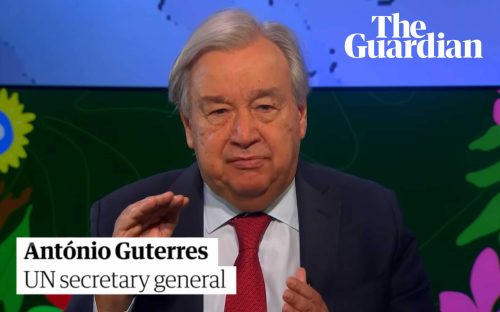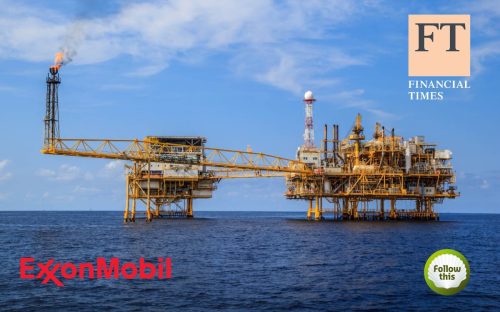Asset manager uses fallacy “not our role to engineer a specific decarbonization outcome”
PRESS RELEASE
During its AGM today, BlackRock denied responsibility for tackling the climate crisis. “It’s not our role to engineer a specific decarbonization outcome in the real economy”, the asset manager said in response to a question by the Union of Concerned Scientists (UCS) and Follow This (full texts in appendix 2 and 3).
“This is a fallacy,” Mark van Baal of Follow This responds. “As the world’s largest asset manager, they don’t have the option not to engineer an outcome; their sheer size and massive holdings imbue them with transformative influence. A vote against emissions reductions steers the pace of decarbonization just as much as a vote in favor. To tackle the climate crisis, the world must reduce emissions.”
In recent years, BlackRock voted against climate resolutions that requested oil and gas companies to reduce carbon emissions, effectively endorsing them to exacerbate the climate crisis.
“BlackRock endangers its clients’ wealth by backing Big Oil,” Van Baal continues. “The world’s largest asset manager has a key role in tackling the climate crisis but acts in opposition by voting against emissions reductions at Big Oil.”
“We call upon concerned investors who entrust their assets to BlackRock to urge the world’s largest asset manager to act as a steward of the global economy and vote in favour of emissions reductions, especially at the largest emitters.”
APPENDIX 2: QUESTION AT BLACKROCK’S AGM
BlackRock has walked back its assertion that companies & investors have a key role to play in the clean energy transition as “climate risk is investment risk.” BlackRock now says its role is not to “engineer a specific decarbonization outcome.”
BlackRock’s significant stakes in investee companies & sheer scale of assets under management mean the firm’s decisions move markets & wield outsize influence. Yet BlackRock continues to support fossil fuel companies that apparently seek to engineer a specific non-decarbonization outcome.
A new report from UCS, Decades of Deceit, shows how fossil fuel companies continue to distort science & lobby against climate action, even as they plan to produce more oil & gas and abandon climate targets.
Given the extreme risk that climate change poses to humanity & the economy, how can BlackRock square its fiduciary duty to clients with continuing to support companies whose actions & investments are engineering such a negative outcome?
APPENDIX 3: ANSWER BLACKROCK
BlackRock transcript:
John Rowe, head of the Americas for BlackRock’s Investment Stewardship Team:
BlackRock’s investment view is that the energy transition is one of several mega forces reshaping markets today. As an asset manager, BlackRock’s approach to climate related risks in the opportunities presented by the low carbon transition is based in our role as a fiduciary to our clients. That role is to help our clients navigate investment risks and opportunities. It’s not our role to engineer a specific decarbonization outcome in the real economy, we recognize that it can be challenging for companies to predict the impact of climate related risk and opportunity on their business and operating environments. Many companies are assessing how to navigate the low carbon transition while delivering long term value investors. For companies where these climate related risks are material, we find it helpful when they publicly disclose consistent with their business model and sector, how they intend to deliver long term financial performance through the transition to a low carbon economy including, where available, their transition plan. It is the role of the board and management to set and implement a company’s long term strategy to deliver long term financial returns. As one of many minority shareholders and public companies by US and BlackRock does not direct a company’s strategy or its implementation. Our role on behalf of our clients as long term investors is to better understand how corporate leadership is managing material risks and capitalizing on opportunities to help protect and enhance the company’s ability to deliver long term financial returns.”










